Maduro and Guaidó: Who is supporting whom in Venezuela?
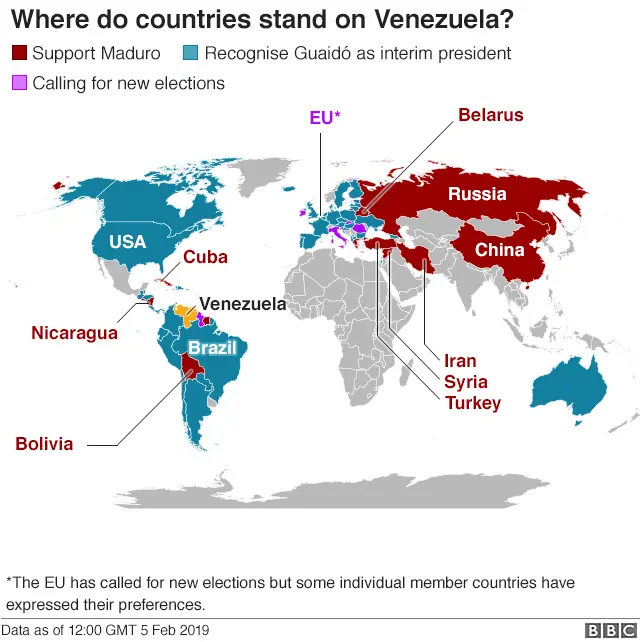 BBC
BBCThe ongoing political crisis in Venezuela has divided the international community - some back President Nicolás Maduro and others support the man challenging him.
Juan Guaidó, who is head of the National Assembly, declared himself interim president on 23 January and vowed to oversee fresh elections.
Here is a guide to which countries are backing each of them and a look at the possible reasons why.
Who supports Guaidó?
The United States
Relations between the US and Venezuela were already fraught before President Trump backed Mr Guaidó as leader.
Tensions began to grow in 1998 when socialist leader Hugo Chávez was elected. Chávez overhauled the country's economic system and was increasingly opposed to US foreign policy.
Relations have continued to worsen under Mr Maduro who came to power in 2013 after Chávez died.
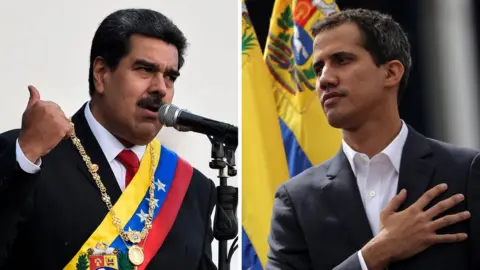 Getty/EPA
Getty/EPAThe US has criticised Mr Maduro's increased use of the country's courts and security forces to suppress political opposition.
They declared his re-election last year as "illegitimate" and imposed a raft of economic measures against Venezuela.
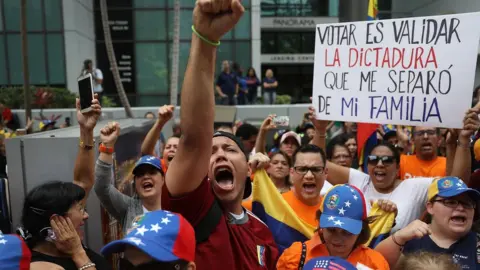 Getty Images
Getty ImagesIn turn, US sanctions have been used as a scapegoat by Mr Maduro to shift blame for the country's economic woes.
Amid a deepening economic crisis, Venezuela has struggled to utilise its supply of the world's largest proven oil reserves.
US purchases of that oil have declined sharply - but companies still import about 500,000 barrels from the country daily.
This amounts to about 41% of Venezuela's total oil exports, the Associated Press reports.
Crucially, unlike other countries that Venezuela is indebted to, American firms pay for that oil in cash.
Fresh Trump administration sanctions aim to frustrate that source of income by targeting PDVSA, the Venezuelan state oil company. Some refineries have already said they will source oil elsewhere.
One US company, Citgo, is a subsidiary of PDSVA. Under new sanctions it is only allowed to operate if its earnings are deposited into an account blocked from President Maduro.
President Trump has refused to take any option off the table in response to the country's crisis, and his administration had pledged to try and divert oil earnings to Mr Guaidó instead.

European Union countries
Austria, Britain, Croatia, the Czech Republic, Denmark, Estonia, Finland, France, Germany, Latvia, Lithuania, Luxembourg, the Netherlands, Portugal, Poland, Spain and Sweden all say they recognise Mr Guaidó as interim president.
It comes after Mr Maduro ignored an EU ultimatum calling for free, transparent and credible presidential elections.
Latin American governments
Most have come out in support of opposition leader Mr Guaidó.
Unsurprisingly, this includes a number of more right-leaning Latin American nations who would be keen, strategically, to reduce the left's influence in Venezuela.
All of the Lima Group, with the exception of Mexico, have voiced their support for the opposition leader.
This includes Argentina, Brazil, Canada, Chile, Colombia, Costa Rica, Guatemala, Honduras, Paraguay and Peru.
Some of those countries have felt the direct impact of Venezuela's crisis.
Amid financial turmoil, hyperinflation and shortages of food - three million Venezuelans have fled across its borders as refugees.
Australia, Canada and Israel, have also backed Mr Guaidó's claim.
Who backs Maduro?
Russia
Russia has continued to back President Maduro.
It has warned the US against military action, and has accused the country of "crudely violating norms" in international law to pursue a course toward "illegal regime change" in Venezuela.
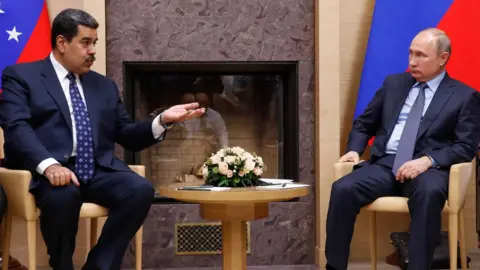 AFP
AFPFor an increasingly isolated Mr Maduro - Russia has provided a source of military and economic support.
Last month it flew two nuclear-capable bombers to the region in a show of support for him.
There was even some suggestion in recent days, from the Reuters news agency, that private Russian contractors had been flown in to protect Mr Maduro - though a Kremlin spokesman has denied the report.
"Putin is giving us support on all levels and we have received it with much pleasure and gratitude," Mr Maduro told Russian media recently.
Economically, Russia has become a crucial lender to Venezuela's stricken economy.
The government, along with state owned oil company Rosneft, has handed billions of dollars in loans to Mr Maduro's government. Reuters has estimated at least £17bn of these have been credited since 2006.
In recent days, Russian officials have made clear they expect Venezuela to continue its repayments, despite the deepening crisis.
Part of the collateral Rosneft has over its loans to PDVSA comes in the form of a 49.9% stake in US oil firm Citgo - a potential source of further tension between the US and Russia if it moves to seize those assets.
China
Though Russia has invested heavily in the country, China is by far Venezuela's largest foreign creditor.
Chinese companies have invested billions in projects in the Latin American nation, including in oil ventures.
The country is estimated to have supplied more than $62bn in loans since 2007 - a third of which is reportedly outstanding.
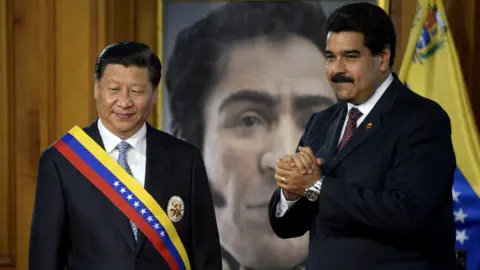 Getty Images
Getty ImagesIn September last year, President Xi Jinping promised to "provide whatever help it can offer" to the struggling nation - and extended another $5bn credit line.
Responding to escalating tensions, Chinese foreign ministry spokeswoman Hua Chunying called on "all parties to remain rational and keep calm" to reach a peaceful political settlement.
"China opposes foreign forces from interfering into Venezuela affairs," she said, clarifying their support of Mr Maduro.
Both China and Russia serve as permanent members, with veto powers, at the UN Security Council.
After the crisis was brought up at the UN by the US, both countries' ambassadors criticised international interference in Venezuela's internal affairs.
Cuba
Cuba is also a strong supporter of Mr Maduro's position as president.
With similar ideologies, the two countries are allies whose governments have become increasingly interdependent across the last two decades.
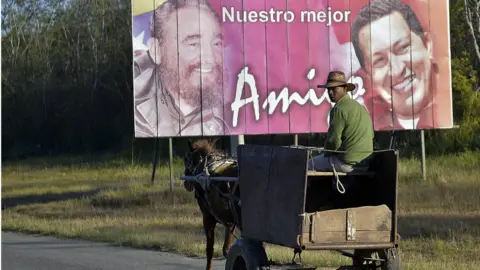 AFP
AFPVenezuela has reportedly subsidised oil exports to Cuba in exchange for support in areas like medicine and military advisors.
Luis Almagro, the Secretary General of the Organization of American States (OAS), likened the depth of Cuba's military support to Venezuela as an "occupation army" - estimating the number is as high as 15,000.
At the Security Council, US Secretary of State Mike Pompeo accused Cuba of having "directly made things worse" in Venezuela.
The country's foreign minister reacted furiously, accusing Washington of designing, financing and arranging the "alleged usurpation" of the Venezuelan presidency through Mr Guaidó.
Longstanding socialist allies Nicaragua and Bolivia have voiced direct support for President Maduro.
Mexico has said it will maintain a position of "neutrality" but said "there is no change in its diplomatic relations" with the government.
It and Uruguay have issued a joint statement asking all sides to defuse tensions and find a peaceful solution to the crisis
Turkey
Mr Maduro also has a backer in Turkey.
The two countries' leaders have embarked on a flurry of recent visits and trade agreements with each other.
President Recep Tayyip Erdogan, who survived an attempt to thwart his own power in 2016, has told Mr Maduro to "stand tall".
"You will respect the results of elections. Trump's remarks shocked me, as someone who believes in democracy," he told a press conference on Thursday.
Iran has also denounced Mr Guaidó's actions and backed Mr Maduro.
"Islamic Republic of Iran supports the government and people of Venezuela against any sort of foreign intervention and any illegitimate and illegal action such as attempt to make a coup d'état," foreign ministry spokesman Bahram Ghasemi has said.
